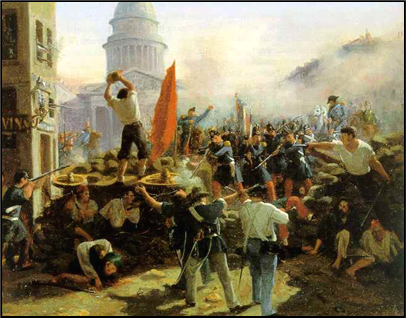


xxxxxFollowing the death of Cardinal Richelieu in 1642, Cardinal Mazarin became the chief minister in France. By the end of the Thirty Years’ War in 1648 the country was faced with spiralling taxes and acute food shortages. The parlement in Paris called for reforms, but Mazarin took a firm line and arrested two of the ring leaders. This sparked off the first Fronde rebellion, based in Paris but with rumblings of discontent in the provinces. Nobility, bourgeoisie and workers took to the streets, protesting against heavy taxes and the absolute rule of the monarch. Eventually the regent for Louis XIV, Queen Anne of Austria, agreed to concessions, but the peace was short lived. As we shall see, in 1650 there was a second Fronde uprising, this time led by dissident nobles in the south who were anxious to reduce the Crown’s grip on government. Known as the Princely Fronde, it was ruthlessly crushed, as we shall see, by 1653 (CW).
THE PARLEMENTARY FRONDE 1648 -
Acknowledgements
Mazarin: detail, by the French painter Pierre Mignard (1612-
 xxxxxFollowingxthe death of Cardinal Richelieu in 1642, the post of chief minister was taken by Cardinal Jules Mazarin (1602-
xxxxxFollowingxthe death of Cardinal Richelieu in 1642, the post of chief minister was taken by Cardinal Jules Mazarin (1602-
xxxxxIn the aftermath of the Thirty Years' War, there was much discontent in the country over spiralling taxes and acute food shortages. In the spring of 1648, the Parlement of Paris -
 xxxxxThis action triggered off the first rebellion, sometimes called the “the Fronde Parlementaire" and centred in Paris. Realising his mistake, Mazarin released the two leaders, but it was too late. Judges of parlement joined with nobility, bourgeoisie and workers of the city in a violent protest against heavy taxes and the absolute nature of crown rule -
xxxxxThis action triggered off the first rebellion, sometimes called the “the Fronde Parlementaire" and centred in Paris. Realising his mistake, Mazarin released the two leaders, but it was too late. Judges of parlement joined with nobility, bourgeoisie and workers of the city in a violent protest against heavy taxes and the absolute nature of crown rule -
xxxxxByxthe Peace of Rueil, ratified on April Fools' Day in 1649 (a portent for the future!), new taxes which were not yet in force were abolished, arbitrary detention was outlawed, and some of the Intendants were withdrawn from provincial authorities. In addition, an amnesty was granted to the rebels. However, as we shall see, the first revolt was no sooner over than the second civil war of the Fronde erupted in 1650, this time led by dissident nobles in the south and specifically aimed at breaking the Crown's stranglehold on all aspects of government. Styled the Princely Fronde (or the Fronde des N obles), it was not put down until 1653 (CW).
obles), it was not put down until 1653 (CW).
xxxxxIncidentally, the word "Fronde" was the name given to a sling (or catapult) used in a children's game at this time. The game was played in the streets of Paris despite being banned by the local authority. It was doubtless used by the rebels as a term of defiance against central government.
C1-


